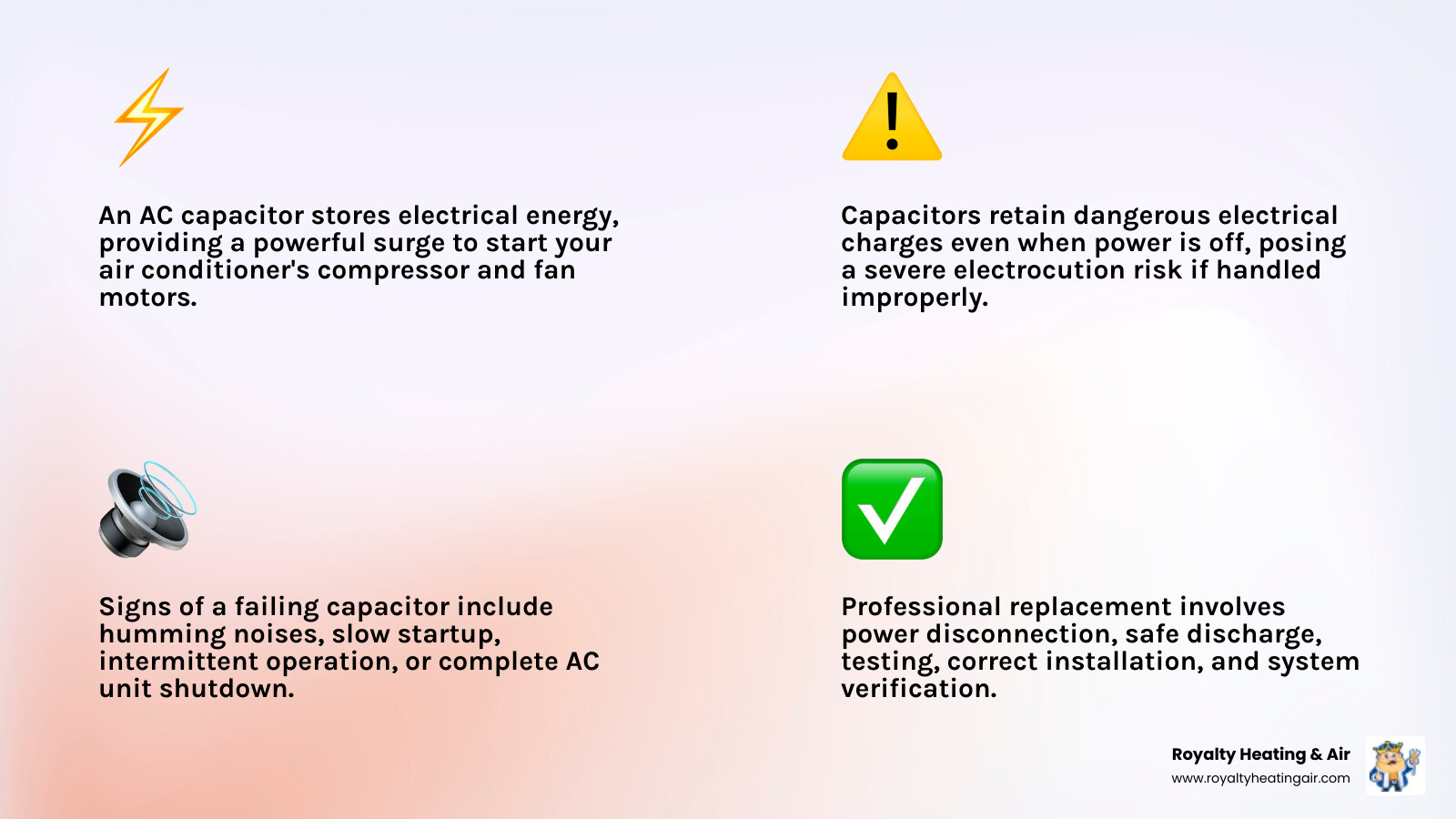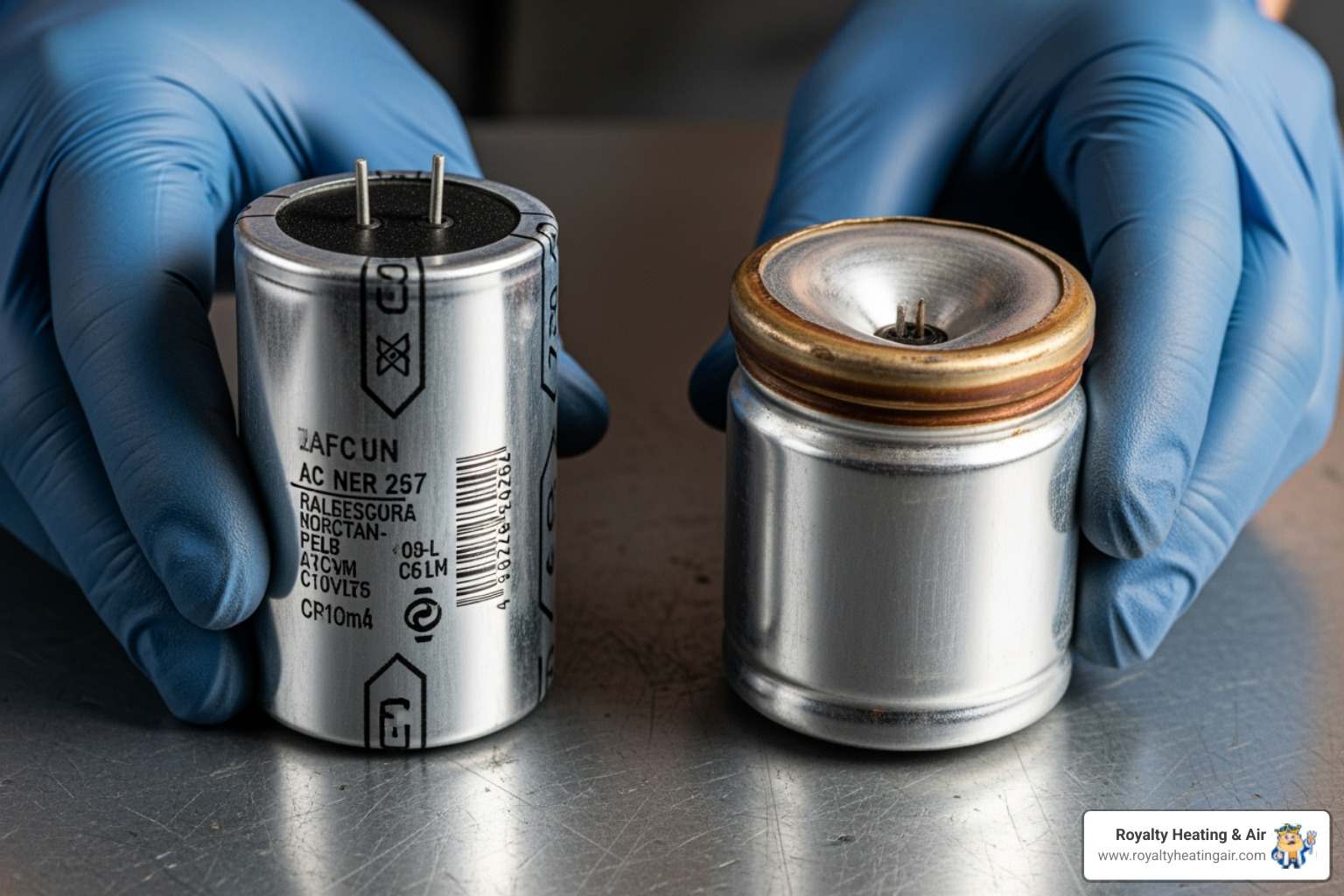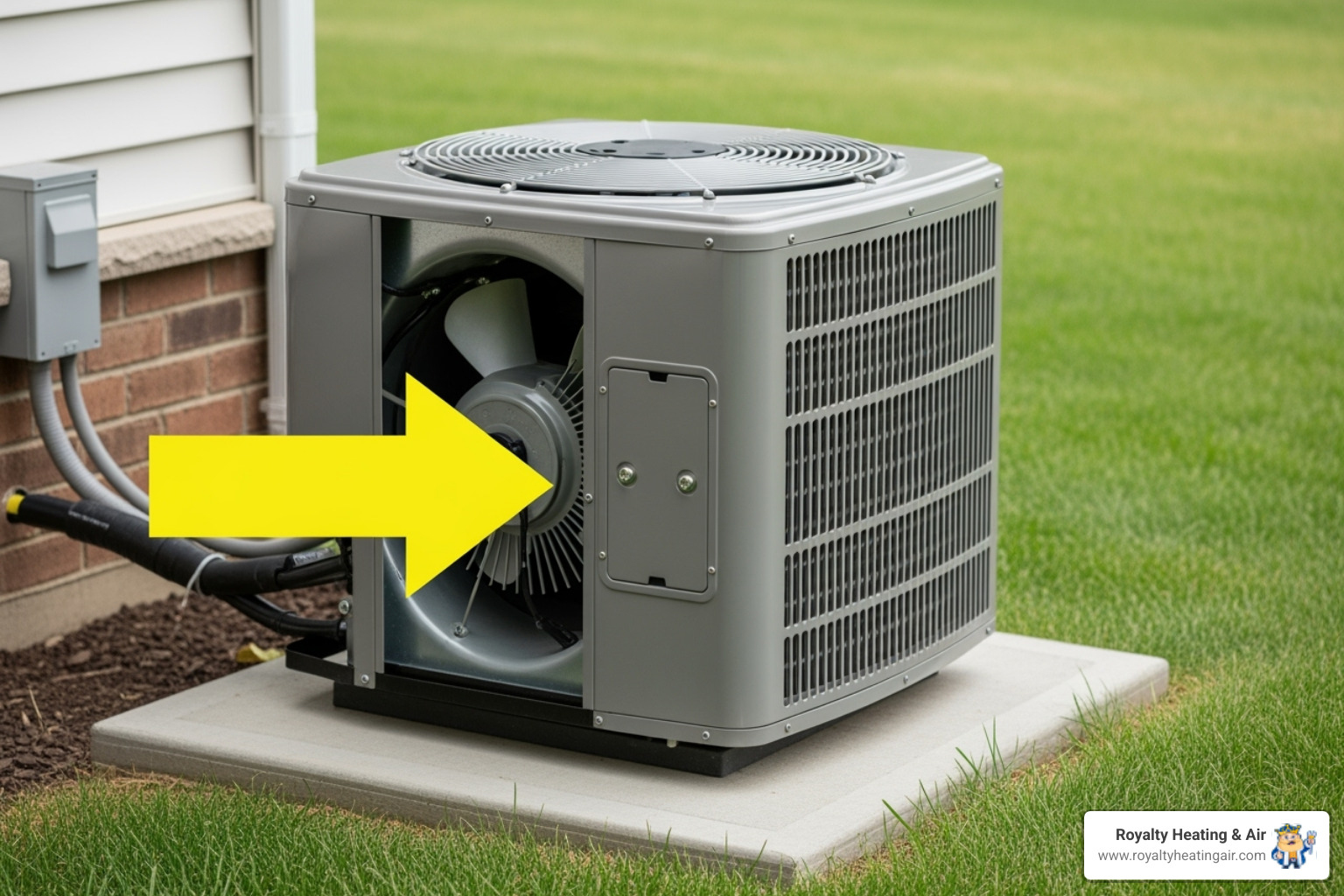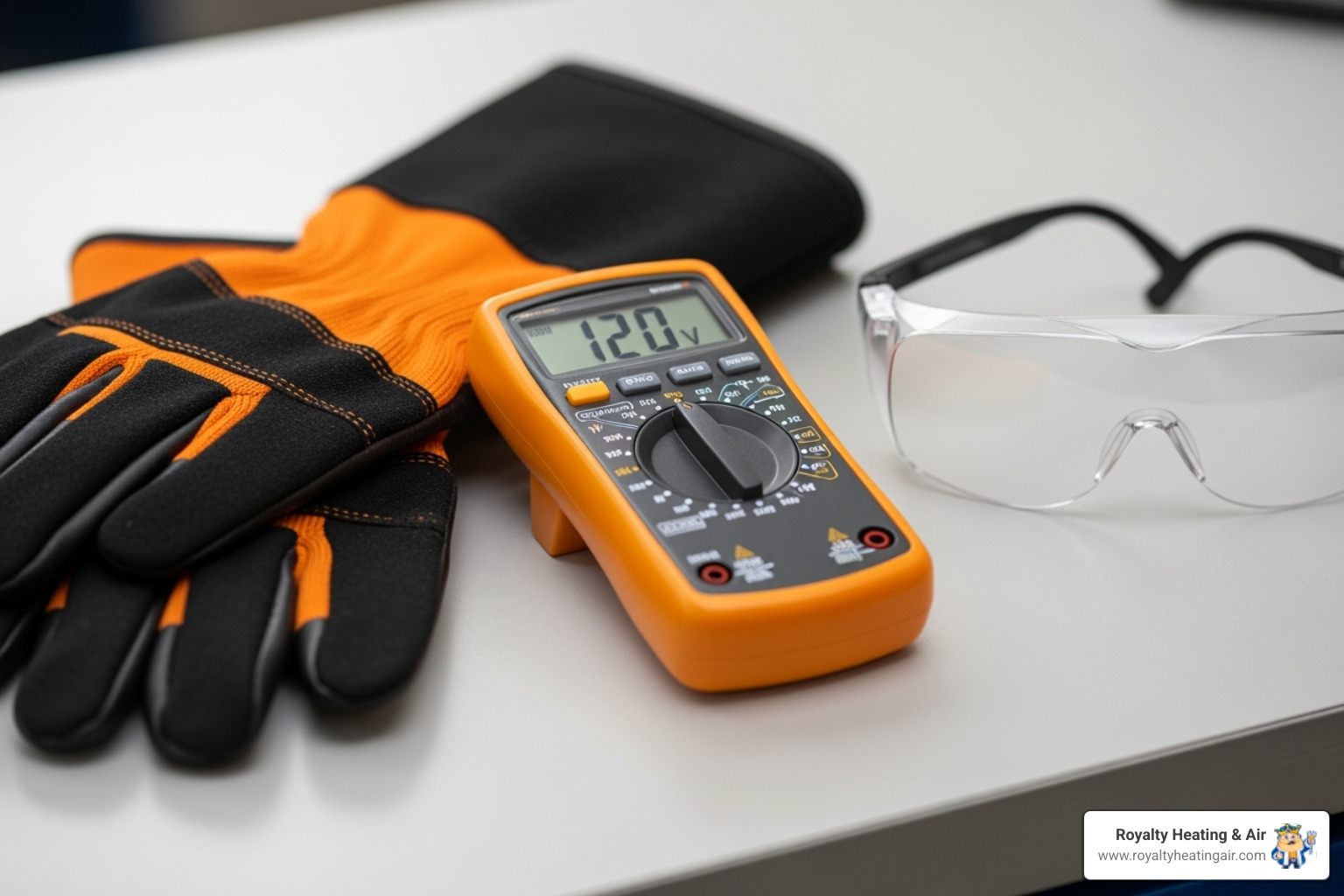When your air conditioner suddenly stops working on a scorching summer day, a capacitor replacement service might be exactly what you need to restore cool comfort to your home.
Quick Answer for Capacitor Replacement Service:
Your AC capacitor is like a car battery for your air conditioning system. It stores electrical energy and releases a powerful surge to start your compressor and fan motors. Without a working capacitor, your AC simply won't run.
Most AC capacitors last 10-20 years, but extreme heat, power surges, and normal wear can cause them to fail sooner. When they do fail, the results are immediate and obvious - your home quickly becomes uncomfortable.
The tricky part? Capacitor replacement involves high-voltage electricity that can seriously injure or kill you, even when your AC is turned off. These components store electrical charges that can discharge unexpectedly, making this repair job strictly for trained professionals.

Think of your air conditioner's capacitor as the starting quarterback of your cooling team. Just like a quarterback calls the play and gets everyone moving, your capacitor stores up electrical energy and then releases it in a powerful burst to get your AC motors spinning. Without this little powerhouse, your air conditioner would just sit there making frustrated humming noises, like a car trying to start with a dead battery.
The thing is, capacitors don't last forever. When they start to fail, you'll know it pretty quickly – and that's when you'll need a professional capacitor replacement service to get your home comfortable again.

Your AC capacitor is basically an electrical energy storage tank that gives your motors the extra kick they need to get started. Picture trying to push a heavy car – you need that initial burst of strength to get it rolling, but once it's moving, it's much easier to keep it going.
Your air conditioning system actually uses different types of capacitors for different jobs. Start capacitors deliver that powerful initial jolt to overcome inertia and get your compressor motor and fan motor spinning. Once everything's running smoothly, they step back and let the run capacitors take over.
Run capacitors stay active the whole time your AC is running, providing steady electrical support to keep your compressor motor and fan motor running efficiently. Some newer systems use a dual-run capacitor that handles both jobs in one compact unit.
Don't forget about your blower motor inside your home – it has its own capacitor too. This little component makes sure the air actually moves through your house. Even if your outdoor unit is working perfectly, a failed blower capacitor means no air circulation, and you'll still be sweating.
All of this stored energy is crucial because AC motors need a serious amount of power to get started. Without that initial jolt from the capacitor, your motors would strain against the electrical system and might not start at all.
Even though capacitors are built tough and typically last 10 to 20 years, they're not invincible. Understanding what kills them can help you spot trouble before you're stuck in a hot house calling for emergency repairs.
Age and normal wear are the biggest culprits. Like everything else, capacitors just wear out over time. The internal components – electrolyte, paper, and aluminum foil – slowly break down. Seals deteriorate and can start leaking. This gradual process reduces the capacitor's ability to hold and release electrical charge effectively. Capacitor degradation is a known issue in electronics, and it's completely normal.
Extreme heat is another major enemy of capacitors. Here in California's Central Valley, where summer temperatures regularly soar, your outdoor unit takes a beating. That direct sunlight beating down on your AC unit doesn't just make the capacitor work harder – it literally cooks the internal components. This is why capacitors in hot climates often fail closer to the 10-year mark rather than lasting the full 20.
Electrical issues can also cut a capacitor's life short. Power surges from lightning strikes, electrical grid problems, or even issues in your home's wiring can overwhelm the capacitor with more electricity than it can handle. It's like trying to fill a water balloon with a fire hose – something's going to give.
Overheating creates a vicious cycle. When other parts of your AC system start struggling, your capacitor has to work overtime to compensate. This extra strain generates more heat, which damages the capacitor faster, which puts more stress on other components. Before you know it, you need more than just a capacitor replacement service – you're looking at multiple repairs.
The good news? Regular maintenance can catch many of these problems before they turn into expensive emergencies. That's why having your system checked annually is such a smart investment in your comfort and your wallet.
Your air conditioner is surprisingly chatty when something's wrong – you just need to know what to listen for. A failing capacitor doesn't usually announce itself with a dramatic explosion (though it can happen). Instead, it whispers its distress through subtle changes in sound and performance that gradually become impossible to ignore.
Think of it like your car making that odd noise for weeks before finally breaking down. Your AC gives you plenty of warning signs, and catching them early can save you from a much bigger headache later.

Your ears are often the first to detect capacitor trouble. That outdoor unit sitting next to your house? It's trying to tell you something important.
The most classic sign is a loud humming noise without any action. Picture this: you hear your AC trying its best – that determined humming sound – but the fan blades aren't spinning and nothing's happening. It's like trying to start your car with a dead battery. The capacitor is attempting to send power to the motors, but it's just too weak to get them moving.
Sometimes you'll hear rapid clicking sounds when the unit tries to start. This clicking often means the capacitor is struggling to engage the electrical contacts that power your motors. It's working overtime but not getting the job done.
The most obvious red flag? Your AC simply won't start at all. You adjust the thermostat, you hear the indoor unit kick on, but that outdoor unit remains completely silent. No humming, no fan, no cooling – just frustrated homeowners on a hot day.
Other times, you might notice sluggish startup behavior. Instead of jumping into action like usual, your AC takes several long minutes to finally begin running. This delay suggests your capacitor is limping along but barely managing its job.
Intermittent operation is another frustrating symptom. Your AC turns on, runs for a bit, shuts off unexpectedly, then tries to restart a few minutes later. This constant cycling happens when the capacitor can't maintain steady power to keep everything running smoothly.
Don't overlook warm air coming from your vents either. While many things can cause this problem, a weak run capacitor can prevent your compressor from working efficiently. The system might be running and making all the right sounds, but it's just not producing cold air.
Keep an eye on your energy bills too. When a capacitor struggles, your AC works harder and runs longer to achieve the same cooling, which shows up as higher electricity costs.
In extreme cases, you might see visible damage to the capacitor itself – bulging at the top, corroded terminals, or even smoke coming from the outdoor unit. If you notice smoke or burning smells, turn off your AC at the breaker immediately and call for professional help.
Ignoring these warning signs is like ignoring that check engine light in your car – it might seem fine now, but you're heading for bigger trouble. A struggling capacitor doesn't just affect your comfort; it creates a domino effect of damage throughout your entire AC system.
When your capacitor can't provide proper power, your motors work much harder than they should. Imagine trying to pedal a bicycle uphill with flat tires – everything becomes a struggle. Your compressor motor, fan motor, and blower motor all strain against the inadequate power supply, wearing themselves out much faster than normal.
The compressor bears the brunt of this damage. As the most expensive component in your AC system, the compressor needs that strong electrical surge to start up properly. Without it, the compressor overheats, works inefficiently, and can fail completely. Replacing a failed compressor often costs more than buying a new AC unit entirely.
System inefficiency becomes a major problem too. Even if your AC manages to run, it's not running well. Longer cooling cycles, higher energy consumption, and less effective temperature control become your new normal. What used to cool your house in 20 minutes now takes an hour.
You might also notice your circuit breaker tripping repeatedly. When motors struggle to get the power they need, they draw more electricity than the circuit can safely handle. Your breaker trips as a safety measure, but it's also telling you something's seriously wrong with your system.
Most importantly, delaying a capacitor replacement service dramatically shortens your entire AC system's lifespan. Components that should last 15-20 years might fail in just 10-12 years when forced to compensate for a bad capacitor. What could have been a simple, affordable repair becomes a full system replacement years ahead of schedule.
The good news? Catching these problems early and getting professional help means you can usually fix the issue before it cascades into something much more expensive and disruptive.
Picture this: you're feeling handy after watching a YouTube video, and you think, "How hard could it be to swap out a capacitor?" We get it – there's something deeply satisfying about fixing things yourself, and sometimes it does save money. But when it comes to AC capacitor work, we're going to be your voice of reason here. This is absolutely not the time to channel your inner DIY enthusiast.

Let's talk about the elephant in the room: AC capacitors can seriously hurt you. We're not trying to scare you, but these components store enough electrical charge to cause severe injury or even death. That's not an exaggeration – it's a stark reality that makes professional capacitor replacement service the only safe choice.
Here's what makes DIY capacitor work so dangerous. First, there's the stored electrical charge issue. Even after you've turned off your AC at the thermostat and flipped the breaker, that capacitor is still holding onto a dangerous amount of electricity. It's like a loaded spring that can discharge without warning when you touch the wrong spot. This invisible threat has caught many well-meaning homeowners off guard.
Then there's the matter of getting the right part. Capacitors aren't one-size-fits-all components. They come with specific voltage ratings and microfarad measurements that must match your system exactly. Grab the wrong one, and you might damage your compressor motor or cause the new capacitor to fail immediately. It's like trying to jumpstart your car with the wrong battery – things can go wrong fast.
Your manufacturer's warranty is another casualty of DIY repairs. Most AC companies require certified professionals to handle repairs to keep your coverage valid. As home inspection experts note, DIY repairs often lead to code violations and can void your warranty entirely. What starts as trying to save a few dollars can end up costing you thousands when your warranty protection disappears.
The fire hazard aspect is particularly concerning. Electrical components that aren't handled properly can overheat, short circuit, and potentially ignite. Your home's safety is simply too important to risk on a DIY experiment, no matter how confident you might feel.
When you call Royalty Heating & Air for a capacitor replacement service, you're getting more than just a part replacement – you're investing in a systematic, safety-first approach that protects both you and your AC system.
Our certified technicians follow a precise sequence that starts with complete power disconnection. We shut off power at both the thermostat and the main electrical panel, ensuring no electricity can flow to the unit while we work. Next comes the critical capacitor discharge step – using specialized insulated tools, we safely release any stored electrical charge before touching anything.
The diagnostic phase involves thorough testing with professional multimeters to confirm the capacitor's failure and measure its exact specifications. We don't just assume the capacitor is bad – we verify it with precise measurements.
During the installation process, we carefully document all wiring connections before removing the old capacitor. This ensures the new component gets wired exactly right. The replacement capacitor must match the original's specifications perfectly, or exceed them in voltage rating – never less.
Finally, we conduct comprehensive system verification. We test the new capacitor, restore power, and run your AC through its paces to make sure everything works smoothly. You get to see your system spring back to life, and we provide documentation of the work for your records.
This methodical approach means you get reliable results without risking your safety, your warranty, or your AC system's integrity. It's the difference between a quick fix and a lasting solution.
When it comes to AC capacitors, homeowners often have similar questions swirling around in their minds. These little electrical powerhouses are so important to your comfort, yet they remain somewhat mysterious to most of us. Let's clear up some of the confusion and answer the questions we hear most often at Royalty Heating & Air.
You bet it can! A failing capacitor is like having a weak heart trying to pump blood through your body – everything has to work harder to get the job done.
When your capacitor starts losing its ability to store and release electrical energy effectively, your AC motors don't get the power boost they need. The compressor motor and fan motor end up struggling like an old car trying to start on a cold morning. They'll draw more electricity from your home's power supply, desperately trying to overcome the lack of that initial electrical jolt.
This motor inefficiency creates a domino effect throughout your system. Your AC might run longer cycles because it can't cool your home as effectively. The increased power draw from straining components shows up as higher numbers on your utility bill, month after month.
Think of it this way: if you had to push a heavy boulder up a hill without a running start, you'd use a lot more energy than if someone gave you that initial boost. That's exactly what happens when your capacitor can't provide the electrical "running start" your motors need. Getting a timely capacitor replacement service can actually save you money by restoring your system's efficiency.
While capacitors will eventually need replacement (it's just the nature of electrical components), you can definitely help yours live its best life and potentially avoid premature failure.
Regular HVAC maintenance is your capacitor's best friend. During our annual tune-ups, our technicians can spot early warning signs of capacitor wear and address small issues before they become big problems. We'll also ensure your entire system is running smoothly, which reduces stress on all components.
Cleaning your outdoor unit might seem simple, but it makes a huge difference. When leaves, grass clippings, and debris clog up your condenser, your system works overtime to move air and cool your home. This extra strain generates more heat, and heat is one of the biggest enemies of capacitor longevity.
Don't forget about ensuring proper airflow inside your home too. Clean air filters and unblocked vents mean your system doesn't have to fight to circulate air. When your AC runs efficiently, every component – including that hardworking capacitor – experiences less stress.
If possible, consider shading your outdoor unit from direct sunlight during the hottest parts of the day. A strategically placed tree or awning can help keep temperatures down around your capacitor. Just make sure you don't block the airflow – your unit needs to breathe!
Absolutely! This surprises many homeowners, but your furnace likely has a capacitor that's just as important as the one in your outdoor AC unit.
Your furnace's blower motor is the unsung hero that pushes warm air through your ductwork and into every room of your home. Just like the motors in your AC, this blower motor needs that electrical boost to start spinning and keep running efficiently. Without a healthy capacitor, your furnace might struggle to circulate air properly, leaving some rooms toasty while others stay chilly.
This means your capacitor works year-round, not just during cooling season. Whether you're heating in January or cooling in July, that blower motor capacitor is helping maintain comfortable air circulation throughout your home.
So when we talk about furnace maintenance, checking the blower capacitor is always part of our routine. A failing furnace capacitor can leave you with poor airflow and uneven temperatures, even if your heating system is otherwise working perfectly. It's another reminder that your HVAC system is truly interconnected – every component plays a vital role in keeping your family comfortable.
Your AC capacitor might be small, but as we've finded together, it plays an absolutely crucial role in keeping your home comfortable. This little electrical powerhouse is what gets your compressor and fan motors spinning, and when it fails, your entire cooling system comes to a grinding halt.
We've walked through the warning signs – those telltale humming sounds, the frustrating clicking noises, and the dreaded moment when your AC simply won't start. We've also explored why ignoring these red flags can lead to much bigger headaches, like compressor failure or complete system breakdown.
But here's the most important takeaway: a failing capacitor is absolutely not a DIY project. Those stored electrical charges can be dangerous, even deadly, and the risk simply isn't worth it. Professional capacitor replacement service isn't just about convenience – it's about keeping you and your family safe while ensuring the job gets done right the first time.
The good news? When you choose the right professionals, getting your comfort restored can be surprisingly quick and stress-free. A skilled technician can diagnose the problem, safely replace the faulty capacitor, and have your system running smoothly again, often in a single visit.
When your AC goes down, especially during those sweltering summer days here in Northern California, you need certified technicians you can trust. At Royalty Heating & Air, we understand that HVAC emergencies are stressful enough without worrying about whether your repair team knows what they're doing.
Our experienced technicians come equipped with the specialized tools and safety equipment needed for capacitor replacement service. We follow that meticulous step-by-step process we outlined earlier – from safely discharging stored electricity to testing the new capacitor before we leave your home. No shortcuts, no guesswork.
What sets us apart goes beyond technical expertise. We're deeply rooted in the communities we serve throughout Roseville, Loomis, Rocklin, Lincoln, and Granite Bay. Our partnership with the MackAttack Foundation, supporting foster babies and sponsoring family adoptions, reflects our commitment to making a positive difference in people's lives – whether that's through reliable HVAC service or community support.
When you choose Royalty Heating & Air, you're getting reliability and peace of mind. You're working with professionals who genuinely care about your comfort and safety, and who stand behind their work with the confidence that comes from years of experience.
Don't let a faulty capacitor turn your home into a sauna. Schedule your AC repair in Lincoln, CA and let us restore your comfort with the expertise and care you deserve.
